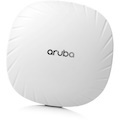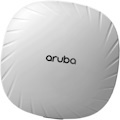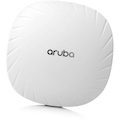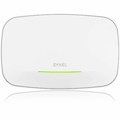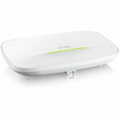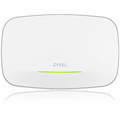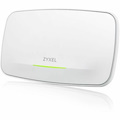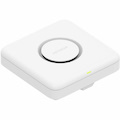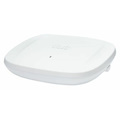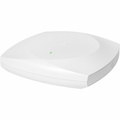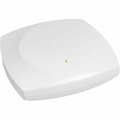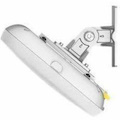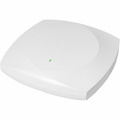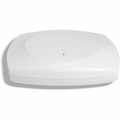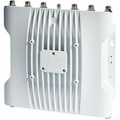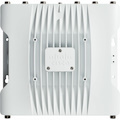With an increasing number of mobile and Internet of Things (IoT) devices reliant on wireless access, networks must be capable of accommodating a diverse mixture of device types, applications and services.
The Aruba 510 series campus access points with 802.11ax technology are designed to deliver high performance access for mobile and (IOT) devices in environments where density is an issue. The 510 series uses 802.11ax features to efficiently and simultaneously serve multiple clients and traffic types in dense environments, increasing data rates for both individual device and overall system.
The 510 series support all mandatory and several optional 802.11ax features, which includes up- and downlink OFDMA with up to 16 resource units, multi-user MIMO (MU-MIMO), 4x4 MIMO with up to four spatial streams in 5GHz and 2x2 with up to two special streams in 2.4GHz, channel bandwidths up to 160MHz (5GHz; 40MHz in 2.4GHz), and 1024-QAM modulation.
The 510 series supports maximum data rates of 4.8Gbps in the 5GHz band and 575Mbps in the 2.4GHz band (for an aggregate peak data rate of 5.4Gbps). Each AP supports up to 256 associated client devices per radio (typical recommended limit for active clients is 150), making the mid-range 802.11ax 510 series APs ideal for high density environments, such as schools, retail branches, hotels and enterprise offices.
In addition to 802.11ax standard capabilities, the 510 Series supports unique features like Aruba ClientMatch radio management and additional radios for location services and IoT applications. This delivers an unsurpassed user experience in today's all-wireless digital work environment and offers up to 4x higher capacity in a cost-effective manner.
HIGH EFFICIENCY
The Aruba 510 Series will efficiently and simultaneously serve multiple clients, increasing data rates for both individual devices and as an overall system. Two key features of 802.11ax are multi-user connectivity and enhanced efficiency using Orthogonal Frequency Division Multiple Access (OFDMA) and multi-user - multiple input multiple output (MU-MIMO).
Multi-user transmission with downlink and uplink OFDMA - OFDMA increases user data rates and also reduces latency, especially for large numbers of devices with short frames or low data-rate requirements, such as voice and IoT devices. By providing multi-user capabilities, a channel can be divided in the frequency domain, and multiple transmissions can be carried simultaneously. OFDMA is particularly effective in raising network efficiency and capacity where there are many devices, short frames, or low data-rate streams.
Multi user transmission with downlink multi-user MIMO - MU-MIMO is another multi-user capability, originally introduced in 802.11ac. This improves network capacity by allowing multiple devices to transmit simultaneously.
Energy efficiency - As higher performance 802.11ax access points will handle a greater number of devices and traffic, they will be driving the need for more power consumption. To offset these demands, Aruba NetInsight includes a feature called GreenAP which allows the 510 series access points to draw less power when it's not being used, such as evenings when the buildings are empty.
- General Information
- Manufacturer
- Hewlett Packard Enterprise
- Manufacturer Website Address
- http://www.hpe.com
- Brand Name
- HPE
- Product Series
- 510
- Product Type
- Wireless Access Point
- Technical Information
- Wireless LAN Standard
- 802.11ax
- Bluetooth Standard
- Bluetooth 5
- Frequency Band
- 2.40 GHz
- 5 GHz
- Number of Internal Antennas
- 4
- Wireless Transmission Speed
- 5.40 Gbit/s
- MIMO Technology
- Yes
- Beamforming Technology
- Yes
- Interfaces/Ports
- Ethernet Technology
- 2.5 Gigabit Ethernet
- Gigabit Ethernet
- Number of Network (RJ-45) Ports
- 2
- PoE PD Port
- Yes
- USB
- Yes
- Management Port
- Yes
- Physical Characteristics
- Form Factor
- Ceiling Mountable
- Wall Mountable
- Rail-mountable
- Height
- 46 mm
- Width
- 200 mm
- Depth
- 200 mm
- Weight (Approximate)
- 810 g





